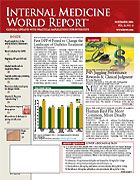Publication
Article
Internal Medicine World Report
New Compounds Are Changing the Face of Breast Cancer Therapy
Author(s):
From the Joint Cancer Conference of the Florida Universities Trastuzumab Cuts Recurrence of HER2-Positive Early Disease by 50%
PALM BEACH, Fla—Immunotherapy with trastuzumab (Herceptin), a monoclonal antibody, in early breast cancer stage II or III for about 1 year after surgery can reduce recurrences by 50% and mortality by 30%, said Stefan Glück, MD, PhD, of the University of Miami.
Dr Glück presented new data at the Joint Cancer Conference of the Florida Universities meeting, adding that the treatment is so successful that “it would be unethical not to use it.” But only those with human epidermal growth factor receptor (HER2)-positive breast cancer are eligible to receive trastuzumab therapy.
Trastuzumab interferes with tumor cell growth by binding to HER2-positive cancer cells, blocking them from dividing and growing. As trastuzumab attaches to the HER2-positive cancer cells, it may signal the body’s immune system to destroy the cell.
Combined with chemotherapy (ie, paclitaxel [Taxol] or docetaxel [Taxotere]), trastuzumab may be even more effective in destroying HER2-positive cancer cells.
Dr Glück explained to IMWR that the drug has been studied without chemotherapy, postchemotherapy, and together with chemotherapy for about 1 year. He sees about 15 new cases a month and usually treats about one third of them. “The results are universally positive, probably the best we’ve seen in the last 30 years for breast cancer,” Dr Glück said.
Approximately 40% of women in clinical trials had symptoms such as chills and fever early in the course of the treatment, infusion reactions most common in the first 24 hours. These and other symptoms (ie, nausea, vomiting, pain) occurred infrequently with subsequent infusions.
In clinical trials the incidence of moderate-to-severe neutropenia or neutropenia with fever was higher in patients receiving trastuzumab plus myelosuppressive chemotherapy versus chemotherapy alone. Therefore, maintaining strict criteria for patient selection is necessary, says Dr Glück. “It must be early breast cancer, and it must be HER2-positive. The patient must be cardiologically assessed. A patient who would have heart disease probably cannot be treated, because the therapy may even kill the patient.”
All of Dr Glück’s initial patients treated with trastuzumab have survived; some have stage IV metastatic breast cancer and are still benefitting from therapy. “Apart from cardiotoxicity, which is reversible, I don’t anticipate too many long-term effects, because it’s like immunotherapy. The moment you stop the treatment, the side effects disappear, and the benefits remain,” he noted.
The targeted therapy is indicated for stage IV breast cancer, which enables physicians to use it in earlier stages of the disease as well. In fact, Dr Glück says, “Any ordinary medical oncologist can prescribe the treatment for the same duration with the same precautions as I would in a university setting.” And therein lies his message to the clinician.
“If you have a patient with breast cancer, you need to ask the pathologist to test for HER2, and, if it is positive and this woman has early breast cancer, you need to discuss with her the use of trastuzumab for treatment, and you should give it every 3 weeks, with or without chemotherapy, for about 1 year.”
Dr Glück says that cardiac function should be measured every 3 months. “Since it is an antibody immunotherapy, it does not have the usual side effects of chemotherapy, such as nausea, hair loss, and other symptoms.”
The next step is to identify women with HER2-negative breast cancer and determine how to treat them more intelligently in the future. Dr Glück stresses the need to identify patients who are at risk for cardiac disease. Some studies suggest that the duration of trastuzumab therapy could be reduced to <1 year; Finnish research indicates that 9 weeks may be enough.
“The most important message is that the 21st century is the era of compounds which are not chemotherapy and will be changing our treatment quite a bit in a positive way, hopefully not only for better outcome, but also less toxicity,” Dr Glück concluded.





